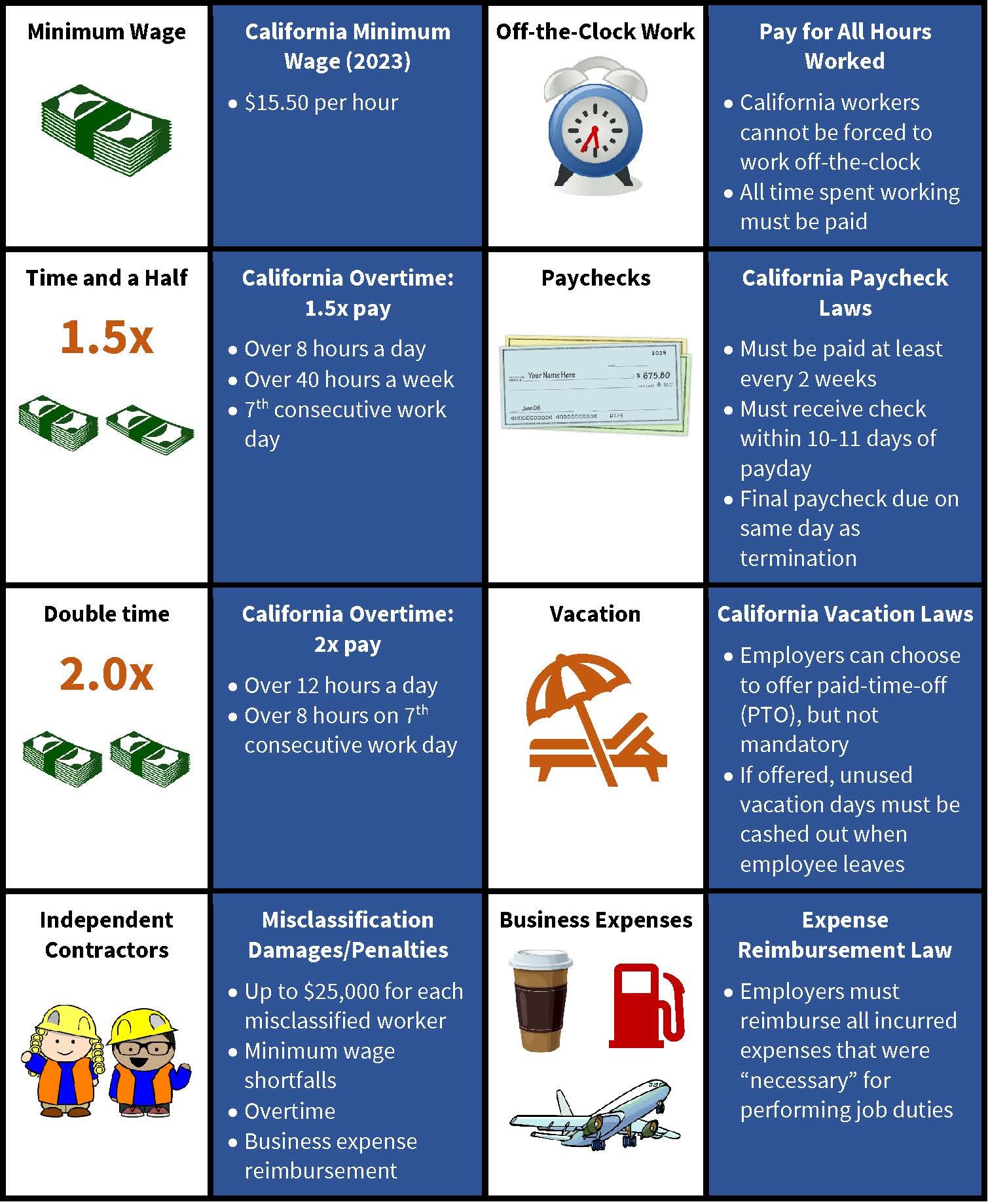
California Labor Laws (2026)
Employment Laws for California Employees
If you live or work in California, you’re lucky! California has arguably the most pro-worker employment laws in the country. Workers are entitled to numerous rights and protections under California labor law, and can recover large penalties if employers violate those rights.
Employers also cannot force you to waive your right to the protections of California labor law. A recent amendment to the California labor code says that an employment agreement cannot force a California worker to accept the labor laws of a different state. Employers sometimes slip a “choice-of-law” provision in their contracts that says the labor laws of the employer’s home state will govern the employment relationship, but CA considers these contract provisions invalid.
Chart Summarizing California Labor Law (2023)

Your rights under California labor law
| California 4-Hour Minimum Shift | California labor law requires that employees who work regular 8-hour shifts be paid for a minimum of four hours if they are sent home early, or have to check in every day to see if they are scheduled. |
| California Independent Contractor Law | Employers sometimes misclassify workers as “independent contractors” rather than “employees.” Incorrect classification can keep workers from getting their full rights under the law. Workers can recover labor code penalties of up to $25,000 per violation if they are misclassified. |
| California Overtime Law | Under California labor law, non-exempt employees are entitled to 1.5x their regular pay for hours worked beyond 8 per day (or 40 per week) and 2x their regular rate for hours worked beyond 12 per day. There are also other scenarios where workers are entitled to overtime in California. |
| California Minimum Wage Law | The minimum wage in California for 2025 is $16.50 per hour. All non-exempt employees in California are entitled to a guarantee that they will be paid at least this much for every hour they spend “on the clock.” Some local areas in California have even higher minimum wages. |
| California Exempt Employee Law | The California labor code, by default, gives all employees a right to minimum wage and overtime, but some types of salaried employees are considered exempt. Read more about which workers are exempt from California minimum wage and overtime requirements. |
| California Vacation Pay Law | If an employer has vacation pay benefits (also known as paid-time-off), California labor law says those vacation days never expire and can be cashed out if an employee leaves or gets fired. |
| California WARN Act: Layoffs | If an employer lays off 50 or more workers in a one-month period, or closes down a store, or relocates, the California labor code requires they give 60-days’ advance notice. If they don’t, workers are entitled to two months’ pay and benefits. |
| California Final Paycheck Law | If you’re fired, you must be paid your last check that same day. If you quit, your employer has 72 hours to give you a final check. |
| California Off-the-Clock Work Law | If you are forced to work off-the-clock or your employer knows or should know you are voluntarily working off-the-clock, you are entitled to be paid for those unclocked hours. |
| California Paystub Law | If you’re not given paystubs, you can recover penalties up to $4,000 under the California labor code. |
| California Meal and Rest Break Law | If you’re not given breaks at the appropriate times, you can collect penalties of 2-hours’ pay for each day you weren’t given a proper meal and rest break. |
| California Warehouse Quota Law | Employers must give you written descriptions of each quota that you’re subject to, instead of keeping them secret. Also, you can’t legally be required to meet quotas that prevent you from taking bathroom breaks or following safety procedures. |
| California Pay Transparency Laws | Under the California labor code, it’s unlawful for a company to prohibit or retaliate against employees for discussing or sharing information related to wages. |
Differences Between California Employment Law & Federal Employment Law
Generally, California labor law is more pro-worker. And typically, the damages and penalties a worker can recover are higher under California labor law than under federal labor law.
Learn more about the differences between California and federal labor laws.
Meet Some of Our California Employment Attorneys
Steven Tindall
Steven specializes in employment litigation and has been lead or co-lead counsel on several cases that resulted in settlements of over $1 million.
View full profileAmanda Karl
Amanda represents employees, consumers, and sexual assault survivors in complex class actions. She also leads the firm’s Voting Rights Task Force.
View full profileAshleigh Musser
Ashleigh represents consumers and employees in class actions and mass arbitration involving consumer protection and employment law.
View full profileAaron Blumenthal
Aaron represents consumers, employees, and whistleblowers in class actions and other complex litigation.
View full profileJeff Kosbie
Jeff represents workers and consumers in complex class actions involving data breaches and privacy, employment law, and other corporate misconduct.
View full profileOur California Employment Law Practice
About Us
Talk to a California labor & employment lawyer
If you believe your employer has violated California labor law, one of our Oakland-based California employment attorneys can provide a free case evaluation and estimate your damages. Call or message us. No costs or obligations.




